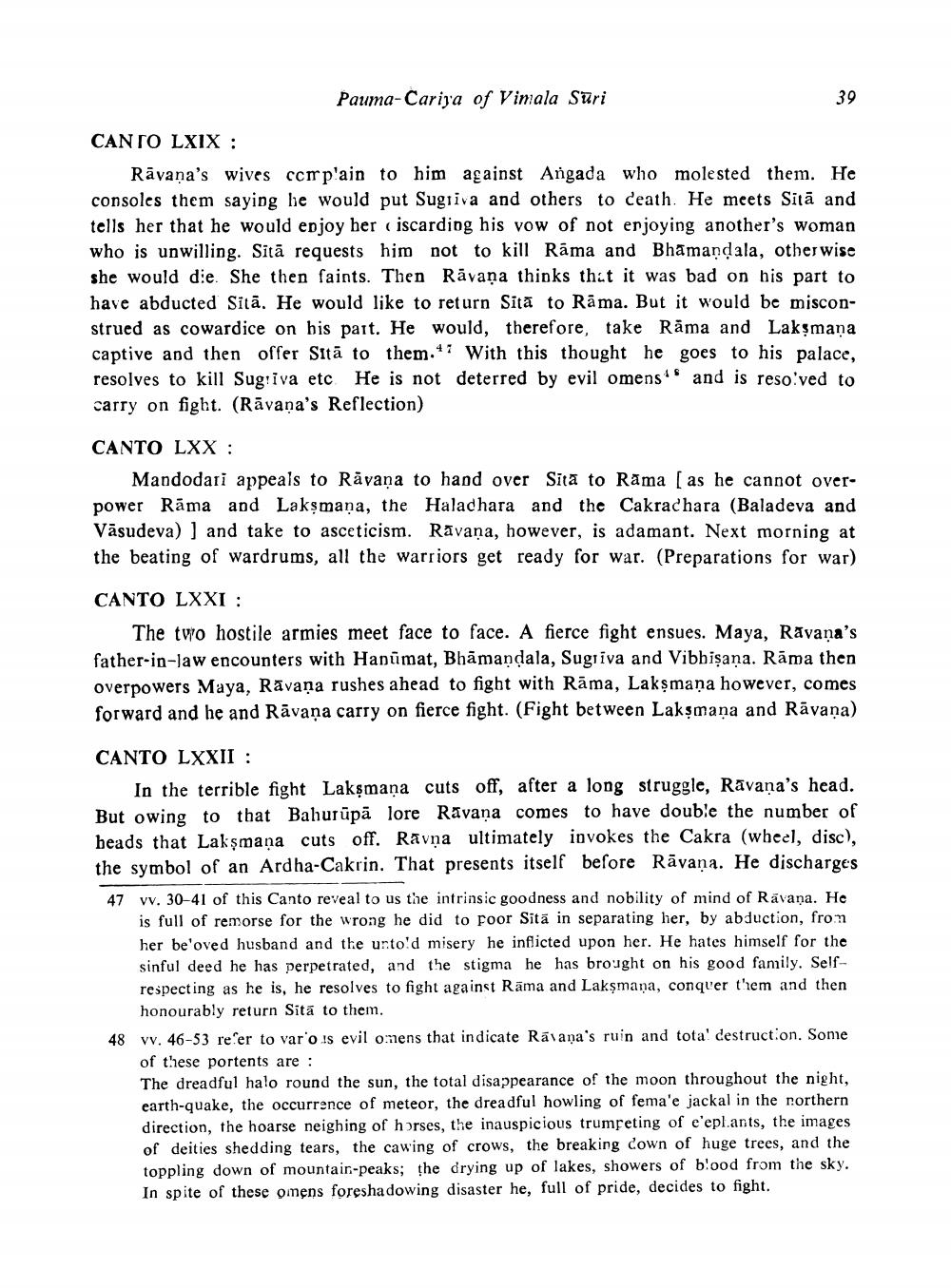________________
Pauma-Cariya of Vimala Sūri
20
CANTO LXIX :
Rāvana's wives ccrrplain to him against Angada who molested them. He consoles them saying he would put Sugriva and others to death. He meets Sitā and tells her that he would enjoy her ciscarding his vow of not enjoying another's woman who is unwilling. Sitā requests him not to kill Rāma and Bhamandala, otherwise she would die. She then faints. Then Rāvana thinks that it was bad on his part to have abducted Sita. He would like to return Sitā to Rāma. But it would be misconstrued as cowardice on his pait. He would, therefore, take Räma and Laksmana captive and then offer Sitā to them.4: With this thought he goes to his palace, resolves to kill Sugriva etc He is not deterred by evil omens and is reso ved to carry on fight. (Rāvana's Reflection)
CANTO LXX :
Mandodari appeals to Rävana to hand over Sita to Rama ( as he cannot overpower Rāma and Lakşmana, the Halachara and the Cakradhara (Baladeva and Vasudeva) ) and take to asceticism. Rāvana, however, is adamant. Next morning at the beating of wardrums, all the warriors get ready for war. (Preparations for war) CANTO LXXI :
The two hostile armies meet face to face. A fierce fight ensues. Maya, Ravana's father-in-law encounters with Hanumat, Bhāmandala, Sugriva and Vibbişana. Rāma then overpowers Maya, Ravana rushes ahead to fight with Rāma, Laksmana however, comes forward and he and Rāvana carry on fierce fight. (Fight between Lakşmana and Rāvana)
CANTO LXXII :
In the terrible fight Lakşmana cuts off, after a long struggle, Ravana's head. But owing to that Bahurüpå lore Ravana comes to have double the number of heads that Laksmana cuts off. Ravna ultimately invokes the Cakra (wheel, disc), the symbol of an Ardha-Cakrin. That presents itself before Rāvana. He discharges 47 vv. 30-41 of this Canto reveal to us the intrinsic goodness and nobility of mind of Rāvana. He
is full of remorse for the wrong he did to foor Sitā in separating her, by abduction, fron her beloved husband and the untold misery he inflicted upon her. He hates himself for the sinful deed he has perpetrated, and the stigma he has brought on his good family. Selfrespecting as he is, he resolves to fight against Rāma and Laksmana, conquer them and then
honourably return Sita to them. 48 v. 46-53 refer to various evil omens that indicate Rāvana's ruin and total destruction. Some
of these portents are : The dreadful halo round the sun, the total disappearance of the moon throughout the night, earth-quake, the occurrence of meteor, the dreadful howling of female jackal in the northern direction, the hoarse neighing of horses, the inauspicious trumpeting of c'eplants, the images of deities shedding tears, the cawing of crows, the breaking Cown of huge trees, and the toppling down of mountain-peaks; the drying up of lakes, showers of blood from the sky. In spite of these omens foreshadowing disaster he, full of pride, decides to fight.




